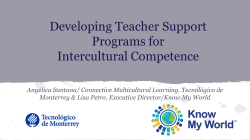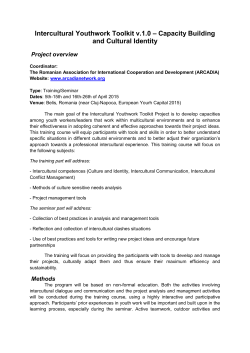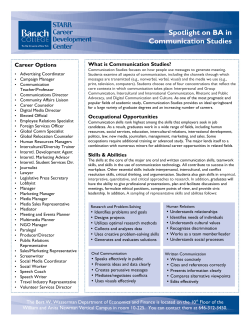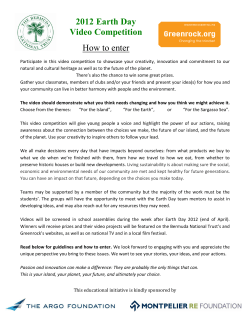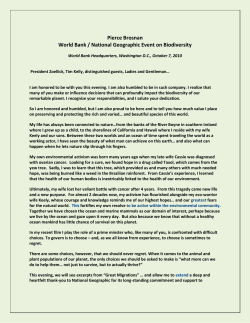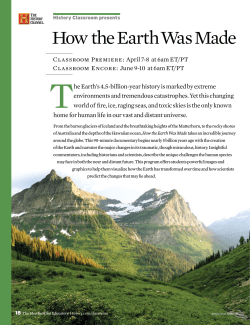
Document 405467
From Doorstep to Planet: The Domestic-International Nexus in Global Learning Shuang Frances Wu Richard Slimbach Whitechapel High Street in London 1 What? what kind of student? [product] Why? To shape what kind of world? [purpose] How? through what learning activities? [pedagogy] Where? In what Settings? [place] 2 WHAT KIND OF STUDENT… 3 …Will repair this world? Gridlocked Cities e Proliferating Slums e Industrial Pollution Rising Temperatures e Melting Ice Sheets e Heat Waves & Drought Floods & Storms eDeforestation & Desertification Species extinction e Water Depletion e Food insecurity Money as King e Market as God ecrap Jobs widening Inequality e Social exclusion e Infectious Disease Peak Oil e Resource Wars e Reciprocating terror Mass Migrations e Trafficked Persons e mass incarcerations Immigrant Bashing e Civil Unrest ePrivatization of commons Technology-Mediated Experience e Connection Addiction Chronic Depression & Obesityedeclining happiness 4 World We Have Global scale (Big is better.) Short-term Profit (Make a buck.) Growth Imperative (More is better.) Standard of Living (Consume.) Competition (compete or die.) Hierarchy (Follow orders.) Quantification (Show me the numbers.) Homogenization (Join the crowd.) Upward Mobility (space over place) Exploitation (Race to the bottom.) Earth as “raw materials” (Neutralize nature.) Cultures = “attractions” (Tourist gaze) Dehumanization (Technological control) Amorality (What soul?) World We Want? Local-scale (Resilient) Long term sustainability Ethic of ‘enough’ Quality of Life Common good Interdependence Qualitative development Cultural preservation Place-making Economic justice Earth as gift, stewardship Cultures = repositories of wisdom Spontaneity Vital faith 5 The university’s Crisis of purpose 1. National competitiveness 2. Institutional reputation & revenue 3. Career empowerment 4. Global citizenship 5. Common good “What is needed is not just more programs, but a larger purpose, a larger sense of mission, a larger clarity of direction.” Ernest Boyer, “Creating the new American college” 6 “You can reasonably set out to put your students in possession of a set of materials and equip them with a set of skills (interpretive, computational, laboratory, archival), and even perhaps (although this one is really iffy) instill in them the same love of the subject that inspires your pedagogical efforts...you might just make them into good researchers. You can't make them into good people and you shouldn't try." Stanley Fish Fish or Freire? “Education either functions as an instrument which is used to facilitate integration of the younger generation into the logic of the present system and bring about conformity or it becomes the practice of freedom, the means by which men and women deal critically and creatively with reality and discover how to participate in the transformation of their world.” Paulo Freire 7 Market Mission 8 Driver & Shotgun Market driven & mission sensitive? Or Mission driven & market sensitive? 9 Essential Learning Outcomes 1. Knowledge of Human Cultures & the Physical and Natural World: study in the sciences & mathematics, social sciences, humanities, histories, languages, arts -Engagement with big questions, both contemporary and enduring questions 2. Intellectual & Practical Skills: inquiry & analysis, critical and creative thinking, written and oral communication 3. Personal & Social Responsibility: civic knowledge & engagement (local and global), intercultural knowledge and competence, ethical reasoning and action -- Anchored through active involvement with diverse communities and realworld challenges 4. Integrative & Applied Learning: The application of knowledge, skills, and responsibilities to new settings and complex problems 10 What kind of Student? Global Global Citizen… Citizen? “You can’t think about what you don’t know, and nobody knows this planet. The people who think globally do so abstractly and statistically, by reducing the globe to quantities…. You can’t act locally by thinking globally. If you want to keep your local acts from destroying the globe, you must think locally.” Wendell Berry 11 … or Rooted Cosmopolitan? “Doorstep” Local/Regional/ National "Rooted Cosmopolitan” “Planet” International “attached to a home of one’s own, with its own cultural particularities, but taking pleasure from the presence of other, different places who are home to other, different people.” Kwame Appiah 12 With what kind of curriculum? Essential geo-cultural challenges: transnational Problems & intercultural “Border Crossings” 13 Learning for pleasure: World as personal Playground Through what learning Experiences? “Few of us ever forget the connection between ‘travel’ and ‘travail,’ and I know that I travel in large part in search of hardship—both my own, which I want to feel, and others’, which I need to see.” Pico Iyer Learning through Travail: World as place of Peril 14 In what settings? The Doorstep & the Planet “I must attempt to care as much for the world as for my household. Those are the poles between which a competent morality would balance and mediate: the doorstep and the planeT.” Wendell Berry 15 World in Motion à New Global Hardship at Home + Opportunity elsewhere = Migration 16 Where’s the “global” in global learning? Garment district, Los Angeles Greater Kailash, Delhi Guess Where Queens, new york Shanghai 17 “The nature of the world today is such that U.S. and global realities, whether economic, cultural, political, environmental or social, interpenetrate and mutually define each other to the degree that isolating U.S. 18 studies from international studies is increasingly impractical” Grant Cornwell & Eve Stoddard Points of Convergence Shared subject: World Shared Values: Human difference; social & ecological justice Shared Context: Communities Shared approach: Interdisciplinary Shared pedagogy: experiential Shared outcome: student & community development Shared burden: marginal status 19 Social Concerns Seminar; Summer Service Learning Program University of Notre Dame HECUA (Higher Education Consortium for Urban Affairs) University of Minnesota The Philadelphia Field Project Penn State Chicago Program Associated Colleges of the Midwest Border Studies Program Earlham College “Makah Culture Past and Present” course Pacific Lutheran University Los Angeles Term Azusa Pacific University “Resettling Refugees and Immigrants in Maine” program Williams College 20 Why a Doorstep-to-planet site progression? #1. Checks exoticism & Hedonism Luang Prabang, Laos Goa, India “Calling something exotic emphasizes its distance from the reader… We call something exotic if it’s so different that we see no way to emulate it or understand how it came to be. We call someone exotic if we aren’t especially interested in viewing them as people — just as objects representing their culture.” N.K. Jemisin 21 #2 Illumines the conditions, causes & costs of inequality 22 23 #3: Frames the world in local-personal terms 24 #4: brings issues of power & privilege to light Touched By an angel? 25 #5: supports a more accessible, affordable, reciprocal & sustainable model of global learning “We must begin to pursue alternative, more sustainable ways to enhance our understanding of the world and our role in it to replace the current, fossil fueldependent study abroad paradigm.” Kati Maginel 26 Doorstep ! Planet ! doorstep #6: creates a basis for comparison & adoption from elsewhere “It is indispensable to be perpetually comparing our own notions and customs with the experience and example of persons in different circumstances from themselves: and there is no nation which does not need to borrow from others, not merely particular arts or practices, but essential points of character in which its own type is inferior.” John Stuart Mill, Principles of Political Economy 27 Lessons in Personal Change (progressive simplification) • Eco-villages, Informal Settlements: Creating a more self-reliant, low-energy, and convivial lifestyle Lessons in Structural Change (social innovation) • Freiburg, Germany: energy consumption • Copenhagen, Denmark: active transportation • Porto Alegre, Brazil: urban governance • Mondragón, Basque Country, Spain: cooperative organization • Havana, Cuba; Dar Es Salaam, Tanzania: food self-sufficiency • Medellin, Colombia: urban design 28 Cosmopolitan Localism New Urbanism e complete streets e Slow Food Community Supported Agriculture e Holistic Medicine Buy Locale Fair Trade e Freecycle e Independent Media farmers markets e Community Bankse cooperative planning social media e Smart Growth e 3D ‘printing’ ezero waste corporate social responsibility e Voluntary Simplicity Transition Towns e liveable wagee renewable energy open source education e fossil fuel divestment Socially Responsible Business e Car Sharing e Bike Co-ops DIY Skill-Sharing e Humane Animal Husbandry “You never change anything by fighting existing reality. To change something. build a new model that makes the existing model obsolete” R. Buckminster Fuller 29 Topical Resources “From Doorstep to Planet: Putting the Local into Global Learning” AAC&U: Global Learning in College: Cross-Cutting Capacities for 21st Century Students Minneapolis, MN – October 16-18, 2014 Shuang Frances Wu, Azusa Pacific University, swu@apu.edu Richard Slimbach, Azusa Pacific University, rslimbach@apu.edu Rooted Cosmopolitanism Ackerman, B. (1994). Rooted cosmopolitanism. Faculty Scholarship Series. Paper 135. http://digitalcommons.law.yale.edu/fss_papers/135/?utm_source=digitalcommons.law.yale.edu%2Ffss _papers%2F135&utm_medium=PDF&utm_campaign=PDFCoverPages Appiah, K. A. (1996). Cosmopolitan patriots. In M. Nussbaum and J. Cohen, Eds., For love of country? Boston: Beacon Press. Appiah, K. (2007) Ethics of identity. Princeton University Press. Appiah, K. (2007). Cosmopolitanism: Ethics in a world of strangers. New York: W. W. Norton & Company. Cohen, M. (1992, Fall). Rooted cosmopolitanism. Dissent, 47883. Domestic-International Interface Althen, G. (1994). Learning across cultures (pp. 145-165). Washington D.C.: National Association of International Educators. Arnove, R. (2007). Comparative education: The Dialectic of the global and the local. Lanham, MD: Rowman & Littlefield Publishers. Bennett, J.M. and Bennett, M.J. (1994). Multiculturalism and international education: domestic and international differences (pg. 145-165). In Althen, G. (Ed.), Learning across cultures. Washington D.C.: National Association of International Educators. Bennett, J.M. & Bennett, M.J. (2004). Developing intercultural sensitivity: An integrative approach to global and domestic diversity. Handbook of intercultural training, 3rd ed. Thousand Oaks, CA: Sage. Castells, M. (2009). Space of Flows. Retrieved from http://www.paulos.net/teaching/2009/AE/readings/protected/CyberCitiesReader-Castells.pdf Cornwell, G.H. & Stoddard, E.W. (1999). Globalizing knowledge: Connecting international and intercultural studies. Washington, DC: Association of American Colleges and Universities. Cortés, C. E. (1998). Global education and multicultural education: Toward a 21st century intersection (pg. 114–133). In L. Swartz, L. Warner, & D. L. Grossman (eds.), Intersections: A professional development project in multicultural education and global education, Asian and American studies. Boston: The Children’s Museum. 1 Davies, G & Butto, J. (2010). At home in the world: Bridging the gap between diversity/multicultural education and internationalization. Annual meeting of the Association for the Study of Higher Education, Indianapolis, Indiana. Goldsmith, W. (1998). Fishing bodies out of the river: Can universities help troubled neighborhoods? (Vol 30, pg. 1205-1246). Connecticut Law Review. Hannerz, U. (1996). The local and the global: Continuity and change. In Transnational Connections (p. 17-29). London: Routledge. Hannerz, U. (1996). Transnational connections: Culture, people, places. London: Routledge. Hannerz, U. (2011). Cosmopolitans and Locals in World Culture. Retrieved from http://www.oneworlduv.com/wp-content/uploads/2011/06/cosmopolitans__locals_culture.pdf Hovland, K. (2006). Shared futures: Global learning and liberal education. Washington, DC: Association of American Colleges and Universities. Kozol, J. (2005). Still separate: Still unequal: America‟s educational apartheid. Harper’s Magazine, volume 311, n. 1864. Kozol, J. (2007). The Big Enchilada. Harper’s Magazine. Lempert, David (1995). Escape from the Ivory Tower: Student adventures in Democratic experiential education. Jossey-Bass. Merryfield, M.M. (1996). Making connections between multicultural and global education: Educators and teacher education programs. Washington, DC: American Association of Colleges of Teacher Education. Neal Sobania (2009). Study abroad or study away? Retrieved from http://www.aacu.org/peerreview/prfa09/pr-fa09_Sobania.com Neal Sobania (2015). Putting the local in global education: Transformative learning through domestic offcampus study. Stylus Publishers. Neidorf, D. (2007). What’s not served in service learning (pg. 13-19). The Common Review. Retrieved from http://www.greatbooks.org/pdf/tcr/42tcr_fall.pdf Noronha, J. (1992). International and multicultural education: Unrelated adversaries or successful partners? In M. Adams (Ed.), New directions for teaching and learning 52 (pg. 53–59). San Francisco: JosseyBass. Olson, C.L., Evans, R., and Shoenberg, R.F. (2007). At home in the world: Bridging the gap between internationalization and multicultural education. Global learning for all. Working Papers on Internationalizing Higher Education, 4. Washington, DC: ACE. Olson, C.L. and Peacock, J. (2012). Globalism and interculturalism: Where global and local meet. In The Sage Handbook of International Higher Education. Los Angeles: Sage. Peterson, Chip (1997). Class and study abroad: Combining concern and compassion with critical analysis. Transitions Abroad. July/August. 2 Peterson, Chip (2002). Preparing engaged citizens: Three models of experiential education for social justice. Frontiers. Vol. 8. Roberts, S. (2008). Less poverty but more inequality in New York. New York Times. Retrieved from http://cityroom.blogs.nytimes.com/2008/08/26/less-poverty-but-more-inequality-in-newyork/index.html?hp. 3
© Copyright 2025
